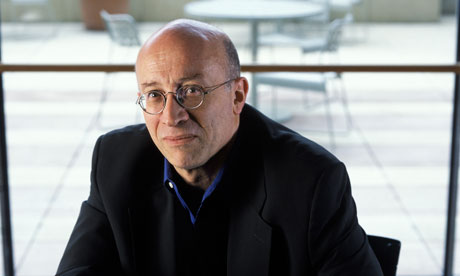
'Everyone needs a Tony Judt in their life." This was how one of his former students responded in 2009 when asked by a high school teacher to describe what Tony Judt was really like. I remember the teacher well. He was himself an intellectually serious man, not just familiar with Tony's work but an avid follower of it: he proudly owned every one of Tony's seven major history books, and subscribed to the New York Review of Books just to read Tony's essays. The teacher left me with a lasting impression of the addictive intellectual aura that Tony generated. I don't think Tony intended it, though he was certainly aware that his intellect made people all over the world wish that they could spend five minutes with him.
I was Tony's student, but ours was not a regular pupil-teacher relationship. He taught me during my final undergraduate semester at New York University in what was by far the best class I ever took, but I always looked up to him more as a nephew would towards an uncle, or even as a surrogate father. In part, this must be because we are related: my great-grandfather and Tony's grandfather were brothers, part of an influx of eastern European Jews that came to London in the early 20th century.
Tony and his family were my first port of call when I arrived in New York as a student in 2007; we would have dinner every week, and after each meal Tony would sit me down and put the pieces of the world in order. He captivated me, but not just because of his intellect; it was for his wisdom, his psychological insights and his sense of humour that I will always remember our dinners together. Tony was a fierce teacher. Such was the esteem in which he was held at NYU, he was effectively given carte blanche to make up university courses at will. The one I took was called "Cinema and Society in Europe since 1945": an analysis of post-war European films. Each week we would watch a different film and spend two hours discussing it. They were the most intense hours of the week. If you missed a class, as I once did, you were issued an extra five-page paper and given a strict dressing-down. "When you are in my classroom you get everything from me," Tony said when describing his own teaching methods. "But you bloody well better give everything too." We did.
After he was diagnosed with ALS (a form of motor neurone disease) in September 2008, the balance of power in all of Tony's relationships turned around. A self-consciously dominating and controlling personality, Tony became – as he would often say – entirely dependent upon the kindness of strangers. ALS is a cruel insult to anyone, but it is a particularly difficult sentence for a man who had spent his life challenging the status quo.
It was precisely Tony's independence as a thinker, a teacher and a man that made ALS, for him, such a humiliating blow. Typically, he fought on to the bitter end, twice almost literally coming back to life after being admitted to hospital with chronic respiratory failures that would normally be fatal in ALS. Tony was very open about his imminent death. "Unlike you," he once told me: "I know exactly how and where I am going to die. The only question is when."
Tony was controversial, but not deliberately. Whether stimulating a conversation on post-war eastern European literature, analysing the films of Werner Herzog, criticising the foreign policies of the US government or reminiscing about ex-wives, Tony was above all interested in the quality of ideas. He thrived on being challenged and loved to disagree: not for the sake of it, but because that is how he thought we should live.
Tony was intensely moralistic, but never self-righteous. His most recent book, Ill Fares the Land, is an attempt to re-invigorate conversations about the right ways to live among a generation (my generation) that, in Tony's view, is self-interested and devoid of a political language. It was not for nothing that Tony was awarded the Orwell prize for outstanding achievement in 2009.
To most people who knew him – who know him – Tony Judt was an inspiration: an intellectual Titan, a fierce warrior, a brilliant orator, a charismatic public intellectual. To be sure, he was all of the above. But those of us who were lucky enough to have spent five minutes with him – or more – know that he never set out to attain any of these high accolades. He just wanted to say what he thought had to be said, and say it until people noticed. A few weeks ago our conversation came around to the question of epitaphs. He wanted his to say, simply: "I did words."
Everyone should have a Tony Judt, and I will miss mine. He did words very well.
Saul Goldberg recently cycled across the US as part of "Move For ALS", an ALS-awareness and fundraising campaign inspired by Tony Judt. The family is asking that any donation to the campaign, which has already raised more than $71,000, be directed through www.moveforals.com

